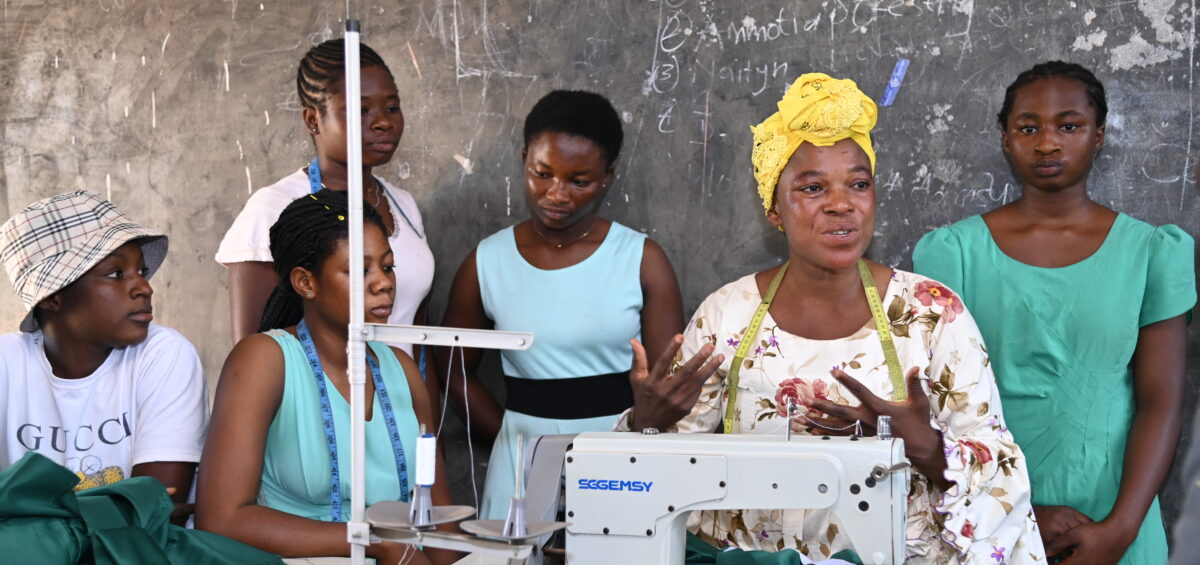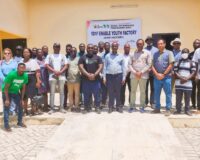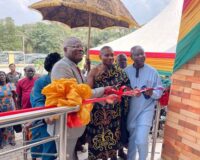In Konongo, a bustling town in Ghana’s Ashanti Region, the story of Nadia Osman stands out as a powerful example of how determination, community support, and access to training can transform not just a business, but an entire community. From modest beginnings in a small tailoring shop, Nadia has grown her enterprise, Nadia Fashion, into a thriving institution that trains, empowers, and employs dozens of young people.
A Spark Ignited by Opportunity
Nadia’s journey into entrepreneurship took a decisive turn four years ago when she attended a workshop organized by BAC in Konongo. The workshop, supported through the Poverty Alleviation Centre (PAC), aimed at training young entrepreneurs and equipping them with business management skills. For Nadia, it was a life-changing event.
“Before that workshop, I was running my business without direction,” she admits. “The training helped me realize that my passion could be more than just a trade—it could be a force for change.”
At the time, Nadia was managing a small sewing shop with just four apprentices. After the workshop, she returned to her shop with renewed energy and a clear vision to scale up. She implemented new practices she had learned, including record-keeping, budgeting, and customer service improvements. These changes transformed her business.
From a Humble Shop to a Thriving Institution
One of the pivotal moments in Nadia’s journey was when she decided to expand her business and reach out to underserved members of her community. She committed herself to providing hands-on sewing training to young people who otherwise had limited access to vocational education.
What started with four apprentices quickly grew to 46. This sudden increase created logistical challenges—her shop could no longer hold all the trainees. But luck was on her side. Through a helpful contact, she found an abandoned school building. With great effort and personal investment, she renovated the space, turning it into the new home of Nadia Fashion. Today, the building stands not only as a fashion hub but also as a symbol of resilience and purpose.
Learning to Manage for Growth
Prior to the BAC workshop, Nadia operated informally. All income was consumed, with little thought of reinvestment or savings. Post-training, she adopted sound financial practices and began reinvesting in her enterprise. She purchased industrial sewing machines, cutting tables, and mannequins to support larger-scale production.
“I had no idea how important financial discipline was until I learned it at the workshop. Now I save consistently and plan before I spend,” she says.
BAC continued to support Nadia through mentorship, equipment support, and guidance. With this assistance, Nadia Fashion became recognized not just for sewing quality garments, but also for grooming the next generation of fashion designers.
Making a Name in Fashion and Beyond
Nadia Fashion specializes in designing unisex apparel and children’s clothing. What sets the brand apart is its commitment to quality, community, and local cultural expression. Her designs blend tradition with contemporary flair, attracting growing attention beyond her immediate locality.
Her dream is to place Nadia Fashion on the global fashion map.
“I want to represent Ghana on international fashion platforms one day,” she beams.
With the foundation she’s built and the impact she’s made, that dream no longer seems distant.
Challenges Along the Way
Nadia’s rise has not been without hurdles. One of her ongoing struggles is limited access to affordable credit. While she’s received in-kind support and some financial assistance through BAC, scaling her production to meet growing demand requires larger capital investments.
“Banks ask for too much. Collateral, guarantees—I don’t have those things yet. But I won’t stop trying,” she asserts.
Managing the growing workforce and keeping up with demand is another challenge. Training over 40 apprentices requires not just space but a structured approach to teaching and monitoring. Nadia is exploring ways to formalize her training by registering Nadia Fashion as a vocational institute.
A Leader and a Role Model
Nadia’s work has inspired many, especially young women in Konongo. Her business provides a safe, skill-building environment for girls, many of whom have gone on to start their own small tailoring businesses.
“Sometimes, parents come to thank me for keeping their daughters off the streets. That’s the best reward,” she says with emotion.
She hopes to start a scholarship scheme in the future for girls who cannot afford vocational training, and she plans to expand Nadia Fashion’s reach by opening branches in other regions.
A Vision for the Future
Looking ahead, Nadia envisions scaling up her production for retail markets and possibly entering export channels. With the right packaging and branding, she believes her garments can compete internationally.
Her priorities include acquiring modern embroidery machines, building an online presence, and participating in national trade shows. She encourages other young entrepreneurs to take advantage of opportunities provided by institutions like BAC and PAC.
“Sometimes, all you need is one training to change your life. Don’t sit idle—go get the knowledge and build something,” she advises.
A Living Testament to Empowerment
Nadia’s story isn’t just about sewing clothes—it’s about weaving hope, resilience, and empowerment into every part of her community. Through her determination, resourcefulness, and smart use of available support systems, she has transformed a small shop into a vibrant hub of fashion, training, and opportunity. Her story exemplifies the Rural Enterprises Programme’s mission: empowering people to create sustainable livelihoods and stronger communities.





